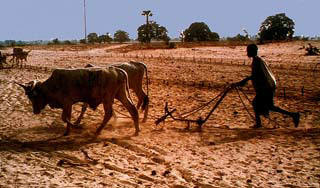
Tropical soils are typically low in organic matter and so present special problems to agriculturalists. The image below shows a very thin tropical soil in West Africa. Because the tropics do not have a winter season, micro-organisms continue to break down organic matter year-round. As a result, tropical soils typically have very small percentages of organic matter or humus--sometimes as little as 1%. A temperate-climate soil may, in contrast, consist of 12 to 14 or (in virgin soils in Iowa) up to 16% organic materials, because the cold winters retard the processes of decomposition and allow organic material to build up over time.

In many tropical regions, farmers practice a semi-sedentary form of agriculture, using fields for two or three years and then abandoning them for a decade or more, until the humus content has been restored by natural processes. In the modern world, the pressure of expanding populations on many rural areas no longer allows for fallow periods of sufficient length. If poor soils are over-used, their fertility diminishes rapidly, leading to famine and desertification.
Time
The time it takes for parent rock to weather and decompose into soil is measured in thousands of years; the time it takes to destroy a soil can be measured in years or, in cases of severe erosion, even days or hours.
Soil and Water Flow
Healthy soil is a friable mass which acts like a sponge when wet. It controls runoff and diverts water into the water table, which may be taken up later by plant roots and transpired back into the atmosphere through plant leaves. Water percolating through soil is filtered and purified. Thus, the health of all terrestrial life forms is ultimately related to and dependent upon the health of the soil.
Sustainability
Civilizations are multi-generational enterprises, and the thin biological and chemically active zone of the planet's surface which we call the soil is highly vulnerable to human uses. It follows that where precious basic resources are concerned, sustainability over time is a high priority which should outweigh immediate gain in decisions about use. Sadly, however, the pressure of immediate need is often very great, and few cultures have had the foresight to value sustainable practices. It has been easier (at least until the present era) to find substitutes for diminishing resources--or to seize someone else's--than to care for and preserve our own resources on our own ground.
| Previous Page | Next Page | Ag Rev Home |